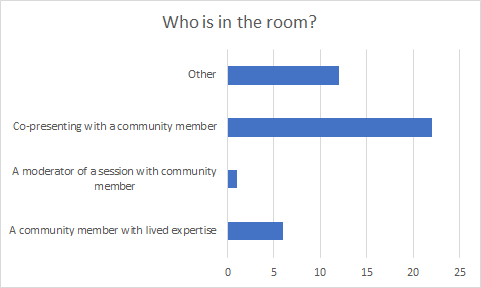All In for Co-creating Inclusive Spaces
As a national initiative, Data Across Sectors for Health (DASH) supports hundreds of multi-sector collaborations in advancing health equity in their own communities. While not leading the day-to-day work at the local level, we continue to support our partners in identifying ways in which to meaningfully engage impacted community members.
In our own efforts at DASH to center community voice and expertise—and to make these types of partnerships more visible—we’ve invited community members with the lived and living experiences of poverty and related, social determinants of health to advise us, as we plan for our upcoming All In: Data for Community Health National Meeting (AINM). Our signature event, the AINM is co-created with a set of national partners and attracts 350 attendees in-person and nearly 500 virtually.
In 2018, we were inspired by the work of the Camden Coalition’s National Center Scholars, which engaged community members with complex health and social needs as advisors to the Center’s National conference. Subsequently, in 2019, we updated our call for proposals process, explicitly encouraging submissions to intentionally include community members as co-presenters.
During the 2020 AINM, we featured Diane Sullivan, a policy strategist with lived experience from Massachusetts, as a keynote speaker. Her presentation, Lived Experience is Expertise: How Engaging Community Members Builds Better Collaboratives, reminded us that if advancing transformational policy change is the goal, we must center our work by first learning from the perspectives of community members around how data gathering and sharing often creates and perpetuates harm.
For this year’s AINM, demonstrating the on-going evolution of our internal efforts to honor and value community perspective and knowledge, we’ve invited Diane and her colleague, Jimmieka Mills from Texas, to engage us as strategy consultants in the planning process. Together, we seek to co-create a space where all community members with lived and living experiences feel a true sense of belonging.
“After meeting and building a relationship with Diane, she shared some insights on how we might make the AINM a more inclusive space,” said Miriam Castro, Program Manager with DASH and All In. “We knew we had to bring in community members earlier in the planning process. So, we connected with Diane in the Spring of 2021, who soon introduced us to Jimmieka.”
Rather than approach this work with set, rigid agendas, we built out a list of ideas for our collective vision. We co-created scopes of work-related activities, including language and other adaptations to our registration and RFP selection process, where Diane and Jimmieka joined other community members on the proposal review team.
“When I was reviewing proposals, I looked for proposals that had diversity and community member voice, and proposals that were giving voice or awareness to the importance of systems designed to data share for the purpose of connecting people to community resources and closing referral loops that ensure folks are being connected to social and public health services. I also looked for proposals that centered on improving access to resources and health services for people from marginalized and/or rural communities.” Mary Calderon, CD(DONA) - community member reviewer.
Additionally, we leaned on the expertise of our strategy consultants by adding an element to our AINM Speaker Prep sessions, entitled, “Creating Inclusive Spaces.” Designed to provide speakers with the usual elements of reviewing meeting themes, important dates, audience engagement tips, and the virtual platform; this training usually provides general tips for a successful presentation.
This year, Jimmieka and Diane guided us on ways to intentionally set an environment where all AINM session presenters, particularly those with lived expertise, feel supported in their ability to participate in the planning and execution of their session. This was where Diane and Jimmieka shone the brightest by sharing insights gained through their own lived experiences, not only providing tips for community members, but also for co-presenters and session moderators on how to foster a supportive space.
“I liked that they took the time to get to know who was in the room that helped them guide how they delivered their material and connect with people,” said Castro.
Speaker Prep Meeting 2021, Audience Composition
Speaker Prep Meeting 2021, First Time Presenting
“Knowing who’s in the room tells us who’s represented and who is not, while bringing awareness to the power dynamics of the space“ notes Jimmieka. “This allows us to pivot, as necessary, to deliver the message in a way that is relevant, relatable, and actionable.”
Together, we hosted a total of 54 presenters, including 20 community representatives. From these training sessions came the idea to host a follow-up pre-conference meeting for community members to ensure they have access to the tools and resources necessary to participate the day of the convening. “When we invite community members to the table, it is upon us to ensure they have access to the support they may need to overcome barriers to their full participation,” says Diane.
Some additional key takeaways from Diane and Jimmieka’s “Creating Inclusive Spaces” portion of our Speaker Prep Training for presenters with lived expertise:
Set and communicate boundaries—only share what you are comfortable sharing
Engage in the session planning process
Inform co-presenters or convening organizers about supports needed to address barriers
Make adjustments, as needed
Practice self-care; communicate your needs and reach out for support
Build your network among each other and AINM attendees
For co-presenters and moderators:
Value lived and living experiences as expertise
Be trauma-informed
Involve community in the session planning process
Affirm and lean into lived expertise; be led by community voice
Support overcoming barriers with tools and resources
Offer a follow up check-in after AINM session
Continue to build, strengthen, and invest in this relationship
Strategize opportunities to further engage and co-create with community
“I’ve enjoyed getting to know Diane and Jimmieka and learning about their unique strengths and areas of expertise,” said Castro. She shared her top 5 tips for engaging with consultants on creating inclusive spaces, and hopes other organizations can learn from:
Shape the project work scope together: It’s okay to enter the first meeting with goals, but leaving room for flexibility and collaboration.
Provide the right amount of training. It’s easy to give the entire work organization history in an hour! Don’t do that. Share what’s most relevant to the work and trust that your consultants will do their homework to bring themselves up to speed.
Monitor the budget regularly as this avoids confusion and ambiguity and also allows consultants to focus on the work at hand.
Maintain clear and direct communication, follow up in a timely manner and recognize when mistakes are made and correct them.
Take time to get to know each other. Cultivate the relationship, celebrate wins and work through areas of tension openly and honestly. Bonus points for making new friends!
Additionally, Jimmieka and Diane are working with convening organizers to develop an evaluation process that seeks feedback from presenters on how inclusive the convening felt to them.
The 5th Annual National Meeting will be held on November 8-10, 2021 from 12-4PM ET, with a pre-conference workshop on November 4th. Register here!
The All In: Data for Community Health National Meeting brings together a diverse group of people from public health, community-based social service, healthcare, national organizations, and other groups at the nexus of working across sectors to leverage data to improve community health. We are excited to highlight inspirational keynote speakers and sessions co-led by practitioners working alongside community members who will share their stories, tools, and lessons. We invite you to share your experiences as they relate to equity and inclusion in multi-sector community-based data sharing projects focused on promoting health and well-being.
Jimmieka Mills and Diane Sullivan are independent, strategy consultants who often combine their individual skill sets and talents to provide technical assistance to organizations seeking to equitably and meaningfully engage community members with lived expertise. Since meeting in Washington, DC at the National Anti-Hunger Policy Conference, the pair has worked on projects, including conference workshop sessions, webinars, trainings, and person-centered research, together with groups that include the All In National Meeting, the Center for Healthcare Strategies (CHCS), the Center for Law and Social Policy (CLASP), Feeding America, and the Food Research and Action Center (FRAC).



